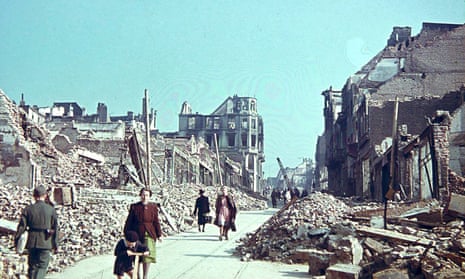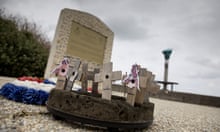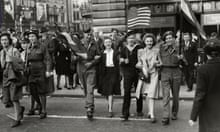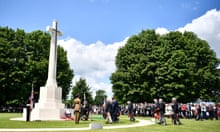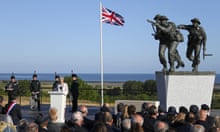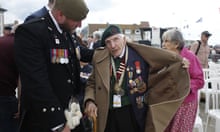On the night of 3 May 1944, just over a month before D-day, pilot Arthur Grain took off in his Lancaster bomber, and never came back. His aircraft was just minutes from its target when it was hit by German shells that sent Grain and his seven crew from 550 RAF squadron hurtling into woodland near the village of Cheniers, north-east France.
Photographs from the time show village residents with a small wooden box containing the human remains they had retrieved from the crash site. Today, white tombstones erected by the Commonwealth War Graves Commission stand in the eastern corner of the cemetery in Cheniers. To their right is a large piece of the wing of Grain’s plane. After 75 years, the metal has not rusted and the black paint is still visible. For a long time, the villagers kept it in a barn. Now it stands like an exclamation mark: this all really happened, right here.
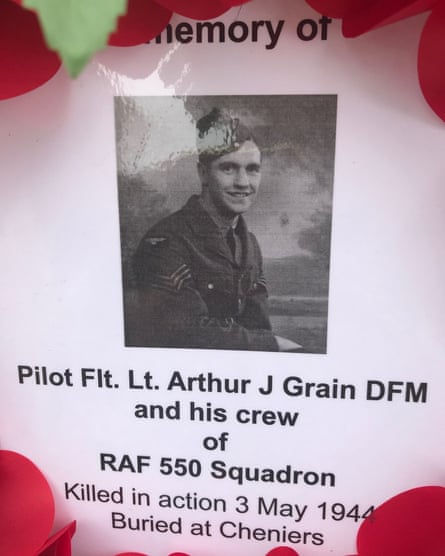
Soon after I met my husband’s family, I learned that Grain – Uncle Arthur, as he is still known to them – had a special place in their hearts. He was a hero, like the 257 other RAF men who died that night. As a German, I still find wartime memories difficult: the Lancaster coffee cup on the breakfast table, the Lancaster biscuit tin. I detached myself from that part of my husband’s heritage until I was confronted, unexpectedly, by the wartime tragedy of another family. This time, it was my own.
Three Christmases ago, while we were staying in my home town of Mönchengladbach, in the Rhineland, my husband asked my father about his memories of the war, and he slowly started to speak: “One morning we came out of the cellar after a heavy air raid. My mother rushed to Uncle Jean’s house with me and my sister. I will never forget that. There Uncle Jean stood, on the rubbles of his house. With bare hands he tried to dig out his three children. And my grandma, and my aunt.”
I was stunned. Just as Uncle Arthur was my husband’s great-uncle, Uncle Chang was mine. That wasn’t his real name, of course, but it was what we called him: Johann – or Jean – rendered in our broad Rheinish dialect. I had known him briefly: there’s a photo of us together from Christmas 1973, me a year old and in his arms. But I had never been told of this tragedy: that in 1944 he lost his mother (my great-grandmother), his sister and his three children died in a bombing raid by British planes. I couldn’t understand why – in stark contrast to the way my husband’s family cherish the memory of Uncle Arthur – this had never been spoken of in my family. Internationally, Germany is well-known for having stared into the dark heart of its past, confronted what it saw, and moved on. But this did not appear to have happened in my family. Why not? I was determined to find out more.
The archivist looked at the print-out. “Oh je,” she said. “Oh dear. The document was issued a month after the attack.” What does that mean, I asked? I had come to Mönchengladbach’s city archive in search of answers but the significance of her reply wasn’t clear. She clarified: “That it probably took four weeks to dig them out.”
Until that moment, the five victims of the 1944 raid were abstract figures to me. Now, 75 years after my great-grandmother died in her basement, I was holding her death certificate in my hand. It had taken barely five minutes to pull this document from digital storage. A document that no one in my family had bothered to ask for and which in an instant put a fate to a name. Franziska Küppers suffocated under the rubble, as did my great-aunt Theodore and the three children: Elizabeth, 15, Max, 11, and Theo, at seven the baby of the family. (The children’s mother had died a few months earlier.) Despite the horror, the document brought a certain relief. There is catharsis in knowing. But I still didn’t understand why my parents had never told me.
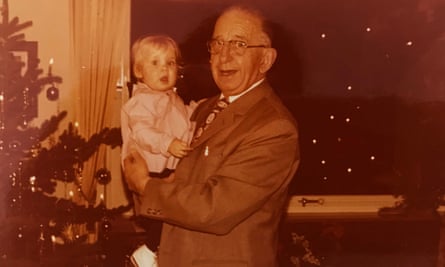
A few weeks ago I walked with my father and aunt – who were four and eight respectively at the time of the bombing, to the house – rebuilt, of course – where Chang used to live. It is not even a 10-minute walk from my father’s place. In front of Neusser Strasse 3 I asked again: Why did you never tell me this? Why did you never talk about it in the family?
There were, of course, stories I heard as a child. How Grandma Bolzen wanted to save the laundry from Chang’s burning house and my dad stopped her screaming. How my grandfather came back from military service and reopened his carpentry shop on a street down the road from their burned-out home. But my parents never took me to visit the graves of Uncle Chang’s family. Why not?
Even 75 years later, I got no answer. “Maybe our parents talked about it, but never in front of us.” The children, in turn, did not pass anything on to their children. One generation has denied the memory to the next generation. A memory of incredible pain, yes, but one that is worth preserving nonetheless.
“History is like a quarry which each generation makes use of,” said Dietmar Süß, a German historian, when I asked him about my family’s story. “Memory is not static; it adapts to the respective political and cultural context.”
According to his research, immediately after 1945, German cities that were bombed intensively commemorated the air war and its victims. With the peace movement in the 1970s, Germans began to face up to their role as perpetrator, and finding a place for their victimhood became more difficult.
In Britain, too, the memory of two world wars feeds national identity, but in a very different way. It is the story of the nation that made huge sacrifices and liberated Europe from Nazi terror. The nation that won the war. But here, too, memory adapts.
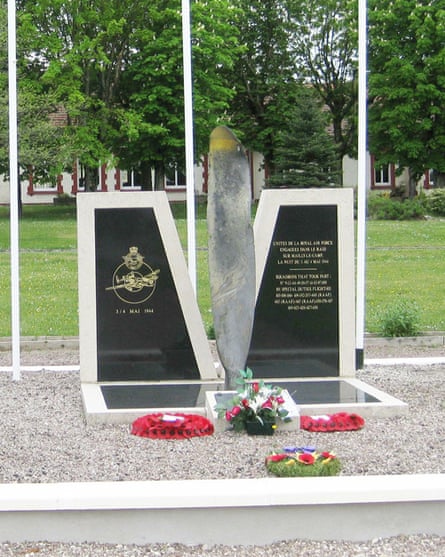
“Remembrance of the second world war in particular is an important component of British national identity,” said historian Richard Overy. “Since 2000 there has been a growth of memorials to its victims and heroes.” Today this memory feeds into the Brexit debate, for example by perpetuating the “better alone” narrative. “Nostalgia for the war avoids modern issues about Britain’s role in the world, evoking an apparently glorious and heroic past, when Britons bravely confronted (usually) the German threat.”
It was on a cold morning earlier this month that an RAF guard of honour from 101 Squadron stood at the war memorial in Mailly-le-Camp, north-central France. Opposite them was a guard of honour from the French military and, in between, a row of French veterans. They faced families, including ours, who had travelled from the UK, France and Germany to remember loved ones, men like Arthur, whose bravery brought the end of Adolf Hitler’s regime.
Above this very spot 75 years ago, German flak made the starry sky bright as day as 346 Lancasters raced through the night, dropping 1,500 tons of bombs on a compound where the Wehrmacht was training tank units ready for the Allied invasion.
On 6 June, world leaders will gather in France to remember D-day. But the attack on Mailly-le-Camp, and many other raids around the time, helped weaken German military defences and infrastructure on French soil. It is a stark illustration of what it had taken to get to that point.
On that night in 1944, German night squadrons used the delayed communication between the RAF advance party and the Lancaster pilots. The Nazis knew the weak point of the Lancasters: their gunners could defend the planes backwards, forwards and sideways, but not downwards. So the Luftwaffe shelled the British from below. Of 346 Lancaster bombers, 42 did not return, one of them Arthur’s. “Missing – no news since take-off,” was the curt expression in the British command’s operation report.
Mönchengladbach is mentioned eight times in the 1985 book Bomber Command War Diaries. It was the first place the RAF attacked, in May 1940, and its location west of the Rhine made it a repeated target. By the end of the war, 50% of its centre had been destroyed.
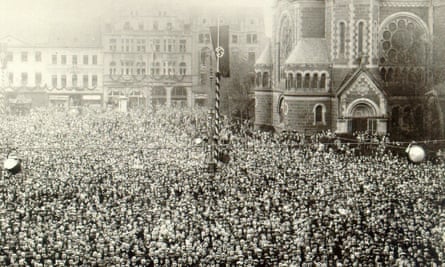
Ever since I was told of the raid on Uncle Chang’s house, a horrible possibility had been lurking in my mind: that Arthur might have flown over Mönchengladbach and unleashed the bombs that devastated my family’s home. After all, records show him involved in a number of raids on German cities, among them Berlin, Leipzig, Stuttgart and Schweinfurt.
Nervously, I waited at the archive counter for the death certificates. My eyes immediately went to the date: 10 September 1944. Uncle Arthur had been killed four months earlier. He was not involved.
I felt relieved, yes. But, more importantly, liberated. Arthur’s and Chang’s stories have enabled me to reclaim an important part of my family’s history. My past is now less of a foreign country.
